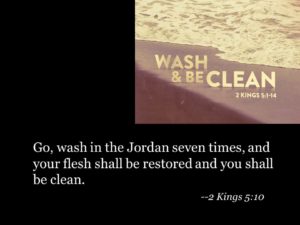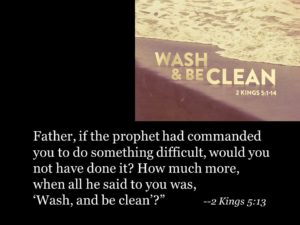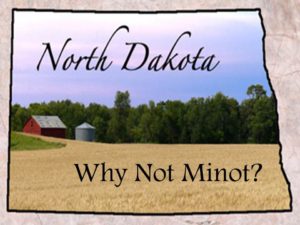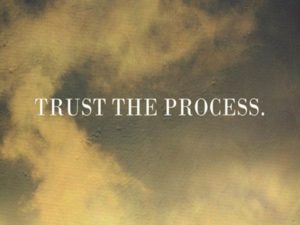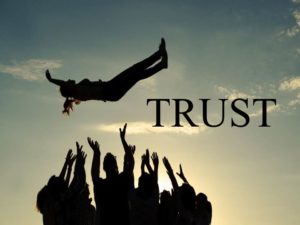The question for us today is not whether or not we should trust the process – but whose process we should trust.
2 Kings 5:1-3, 7-15c
Naaman, commander of the army of the king of Aram, was a great man and in high favor with his master, because by him the Lord had given victory to Aram. The man, though a mighty warrior, suffered from leprosy. Now the Arameans on one of their raids had taken a young girl captive from the land of Israel, and she served Naaman’s wife. She said to her mistress, “If only my lord were with the prophet who is in Samaria! He would cure him of his leprosy.”
When the king of Israel read the letter, he tore his clothes and said, “Am I God, to give death or life, that this man sends word to me to cure a man of his leprosy? Just look and see how he is trying to pick a quarrel with me.”
But when Elisha the man of God heard that the king of Israel had torn his clothes, he sent a message to the king, “Why have you torn your clothes? Let him come to me, that he may learn that there is a prophet in Israel.” So Naaman came with his horses and chariots, and halted at the entrance of Elisha’s house. Elisha sent a messenger to him, saying, “Go, wash in the Jordan seven times, and your flesh shall be restored and you shall be clean.” But Naaman became angry and went away, saying, “I thought that for me he would surely come out, and stand and call on the name of the Lord his God, and would wave his hand over the spot, and cure the leprosy! Are not Abana and Pharpar, the rivers of Damascus, better than all the waters of Israel? Could I not wash in them, and be clean?” He turned and went away in a rage. But his servants approached and said to him, “Father, if the prophet had commanded you to do something difficult, would you not have done it? How much more, when all he said to you was, ‘Wash, and be clean’?” So he went down and immersed himself seven times in the Jordan, according to the word of the man of God; his flesh was restored like the flesh of a young boy, and he was clean.
Then he returned to the man of God, he and all his company; he came and stood before him and said, “Now I know that there is no God in all the earth except in Israel.”
There is a lot of uncertainty and even anxiety when soon-to-be pastors near the end of their time in seminary. A chunk of that anxiety comes because, as a seminarian, you have very little control over where and when your first job will come. You don’t get to choose the churches where you want to apply or send out resumes in the cities where you would choose to live.
Instead you get to hear over and over again from all kinds of people, three words that most begin to loathe – “Trust the Process”.
Now, I could go into church bureaucracy and politics or flaws in the system – inherent marks of most institutional life – but the reality is that “trusting the process” can be a very humbling experience – perhaps a first real-life opportunity for would be pastors to really recognize the bigger picture of service in God’s church.
As the pastoral assignment day got closer in our final year of seminary, students began to imagine where this “trust” might take them – spontaneous chants of “Why Not – Minot?” would erupt from time to time. With no offense intended, of course, to the people of North Dakota, but Minot was essentially located at the end of the Earth for all we knew.
At any rate, Trusting the Process landed Pr Sarah and I in the Appalachian Mountains of Central Pennsylvania – in a place that we certainly would not have chosen for ourselves – but one where we learned a ton about God’s presence and people and about ourselves and who we are in the world too.
As I hear these passages of scripture this morning – I hear this theme of trust resonate in these stories that are principally about healing. I particularly enjoy the story of the army commander Naaman from 2 Kings. Naaman is described as a “mighty warrior” – but one who suffered from leprosy.
Just a quick word on leprosy – leprosy in the Bible is kind of a catchall of skin diseases and not likely to be Hanson’s Disease – what we commonly think of as leprosy in the modern day.
Nevertheless in the community of Israel to have leprosy meant that you would be forced to live separate and away until cleansed, which may or may not happen. While the skin disease may not have been contagious – it was thought to be a sign of sin – hence the need to be cleansed.
Now clearly Naaman had not been ostracized from his community yet – but he’s concerned – concerned enough to seek care outside of his country – to jump at anyone who had the possibility of helping him. He hears a rumor from a young girl taken captive from Israel that there is a prophet there who could cure him.
So he gets a letter of introduction from his king to the king of Israel asking for help. Now, just as the king of Israel is about to lose his mind because the great warrior is asking for something the king cannot provide – Elisha the prophet steps in – and this is the part I love.
Here again is Elisha’s prescription for the mighty warrior’s leprosy:
“Go, wash in the Jordan seven times, and your flesh shall be restored and you shall be clean.” (2 Kings 5:10)
Now, instead of being grateful – instead of “trusting the process” – Naaman gets angry. In his mind, he is being disrespected – not shown the deference and attention warranted a man of his stature and import. Fortunately in his rage – some of his servants approach him and quietly ask:
“Father, if the prophet had commanded you to do something difficult, would you not have done it? How much more, when all he said to you was, ‘Wash, and be clean’?” (2 Kings 5:13)
In this case, to trust is in the simple – the straightforward. At these wise words from his servants – Naaman does what was asked and is cleansed.
The question for me today is not whether or not we should trust the process – but whose process we should trust.
In both of today’s stories – we see examples of healing – we hear God praised for being present and active in that moment, in those situations. But let’s not overlook another important element that is present. In both stories – significant boundaries were crossed – it was not business as usual – risks were taken, patterns changed.
Naaman crossed a national boundary – met with the enemy – humbled himself in ways he probably had never done before. The lepers who called out to Jesus – they were grasping at any hope, any help they could imagine – even the Samaritans among them crossing a boundary to seek help from a Jewish Rabbi.
To trust is to accept an invitation to follow – even when that following leads across boundaries we wouldn’t normally consider – to be open to opportunities we wouldn’t have chosen for ourselves – to be blessed because we stretched ourselves in a new way, a new direction and God meets us there.
In this next month we are again accepting God’s invitation to trust – as we cross boundaries in our congregation:
In welcoming homeless families into our community through Family Promise beginning this evening.
In walking and supporting those who are hungry around the world and in our community through the CROP Walk and through the Thanksgiving Food Drive
In building and sponsoring Personal Hygiene Kits for Lutheran World Relief – as we are reminded, this week, with Hurricane Matthew how fragile life is, as we see how so many find themselves without even the most basic of resources in the wake of the storm
We will cross boundaries:
In welcoming Israeli and Palestinian families through the Parent’s Circle event – listening and learning about the incredible power of reconciliation and the desire to work for peace.
And not to mention the opportunities all of us are given each day to extend ourselves in a new direction – to cross a new boundary in service to God.
We need to call these what they are – they are acts of justice and mercy and compassion. They can be humbling and awe-inspiring. They can be healing not only for the ones who receive, but for the ones who give. And they importantly can remind us that we are not the center of the universe – that there is a bigger picture of which we are a part.
But even beyond that, to trust God’s process is to recognize that we are not alone – that we are a part of a movement of God in the world – one that crosses boundaries to inspire hope and not fear – to proclaim justice and an abundant new life.
All thanks and praise be to God. Amen.
Rev. John Berg
Gloria Dei Lutheran Church
Northbrook, IL

